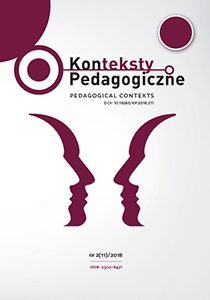Abstract
The following article is a research report, the object of which was to determine the level of one of the manifestations of information literacy. It presents the characteristics of the ability to organize and select information. Fur-thermore, the author proves that the ability to correctly select information is a prerequisite for the proper functioning in the digital information world. The analysis draws attention to one of the main aspects of the information culture of a human being who has the ability to cope with the flood of information.
References
Aftański, P. (2011). Społeczeństwo informacyjne – nowy wymiar informacji. In: W. Furmanek & A. Piecuch (eds.), Problemy i wyzwania społeczeństwa informacyj-nego. Rzeszów: Wydawnictwo Uniwersytetu Rzeszowskiego.
American Library Association (2000). Information Literacy Competency Standards for Higher Education, http://www.ala.org/acrl/standards/informationliteracycom-petency [accessed: 23.07.2018].
Batorowska, H. (2012). Konektywizm w kontekście kształcenia kompetencji informa-cyjnych. Annales Universitatis Paedagogicae Cracoviensis Studia ad Bibliothecarum Scientiam Pertinentia, 10, 20–39.
Batorowska, H. (2013). Od alfabetyzacji informacyjnej do kultury informacyjnej. War-szawa: Wydawnictwo Stowarzyszenia Bibliotekarzy Polskich.
Bulik, J. (2011). Podział klasowy społeczeństwa informacyjnego. Zagadnienia Infor-macji Naukowej, 1, 3–19.
Cukier, K., Mayer-Schönberger, V. (2014). BIG DATA. Rewolucja, która zmieni nasze myślenie, pracę i życie, trans. M. Głatki. Warszawa: MT Biznes.
Filiciak, M., Danielewicz, M., Halawa, M., Mazurek, P. & Nowotny, A. (2010). Młodzi i media. Nowe media a uczestnictwo w kulturze. Raport Centrum Badań nad Kulturą Popularną SWPS. Warszawa: Wyższa Szkoła Psychologii Społecznej.
Furmanek, W. (2002). Kultura techniczna i kultura informacyjna. Eksplikacja pojęcia. Konsekwencje metodologiczne. In: J. Morbitzer (ed.), Techniki komputerowe w prze-kazie edukacyjnym. Kraków: Wydawnictwo Naukowe Akademii Pedagogicznej.
Lau, J. (2011). Kompetencje informacyjne w procesie uczenia się przez całe życie. Wytyc-zne, trans. Z. Wiorogórska et al., http://www.sbp.pl/repository/SBP/sekcje_komisje/komisja_ds_edukacji_informacyjnej/Wytyczne.pdf [accessed: 24.07.2018].
Morbitzer, J. (2004). Świat wartości w Internecie. Konspekt, http://www.ap.krakow.pl/konspekt/18/wartosci.htm [accessed: 8.06.2011].
Maciąg, J. (2018). Konstruktywistyczna perspektywa wspierania dziecka w procesie uczenia się. Konteksty Pedagogiczne, 1, 25–36.
Morbitzer, J. (2003). Informacyjny zalew. In: T. Pilch (ed.), Encyklopedia pedagogiczna XXI wieku, vol. 2. Warszawa: Wydawnictwo Akademickie Żak.
Postman, N. (2004). Technopol, triumf techniki nad kulturą, trans. A. Tanalska-Dulęba. Warszawa: MUZA SA.
Spitzer, M. (2013). Cyfrowa demencja, trans. A. Lipiński. Słupsk: Wydawnictwo Dobra Literatura.
Wenta, K. (2013). Meandry zaufania do Internetu w nieprzychylnym świecie. In: J. Morbitzer & E. Musiał (eds.), Człowiek, media, edukacja. Kraków: Katedra Tech-nologii i Mediów Edukacyjnych Uniwersytetu Pedagogicznego.
In accordance with the recommendation of the Ministry of Science and Higher Education, which aims to counteract the practice of “ghostwriting” and “guest authorship,” all authors submitting their text for publication should attach an author’s statement which declares the contribution of each of the authors to the article. The printed and signed statement should be delivered by mail or other means to editor-in-chief Joanna Skibska or sent in the form of a scan to the following e-mail address: redakcja@kontekstypedagogczne.pl. The authors will not receive remuneration for publishing their papers. The editors reserve the right to make minor editorial changes to the articles which will not affect the substance of the article. We encourage all authors to prepare their articles in accordance with the guidelines for manuscript preparation. Download pdf file.
Authors transfer all copyrights and grant the journal the right of first publication with the work simultaneously licensed under a Creative Commons Attribution License that allows others to share the work with acknowledgement of the work's authorship and initial publication in this journal. All authors agree to the publishing of their email addresses, affiliations and short bio statements with their articles during the submission process.

